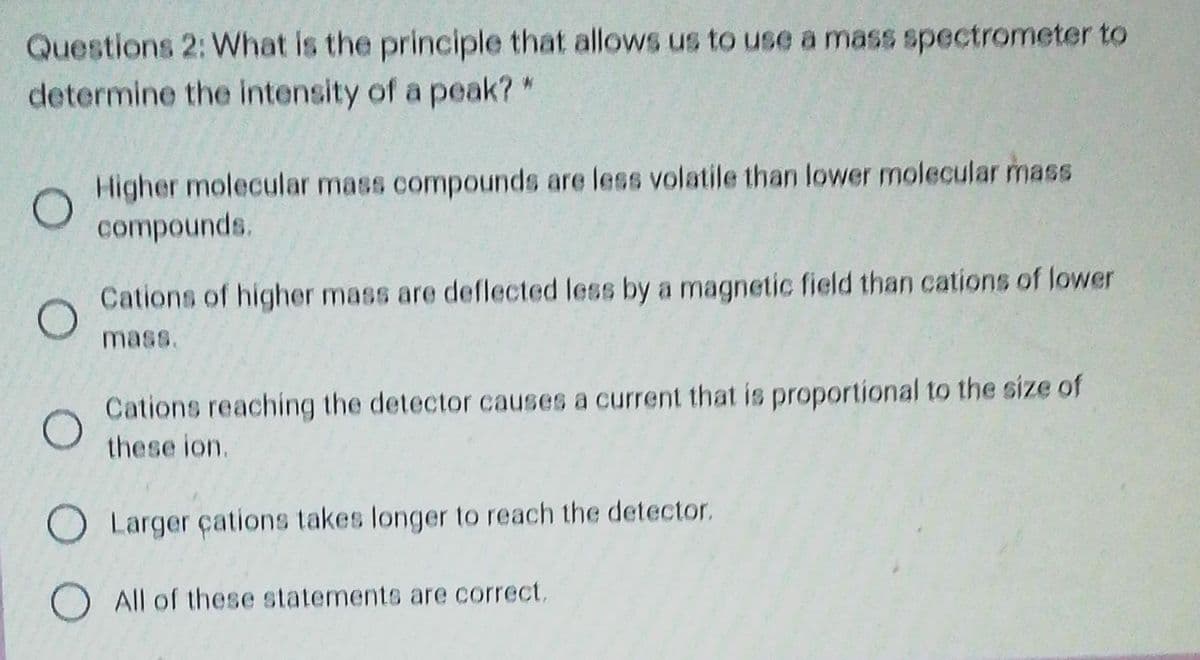Questions 2: What is the principle that allows us to use a mass spectrometer to determine the intensity of a peak?* Higher molecular mass compounds are less volatile than lower molecular mass compounds. Cations of higher mass are deflected less by a magnetic field than cations of lower mass. Cations reaching the detector causes a current that is proportional to the size of these ion. O Larger çations takes longer to reach the detector. O All of these statements are correct.
Questions 2: What is the principle that allows us to use a mass spectrometer to determine the intensity of a peak?* Higher molecular mass compounds are less volatile than lower molecular mass compounds. Cations of higher mass are deflected less by a magnetic field than cations of lower mass. Cations reaching the detector causes a current that is proportional to the size of these ion. O Larger çations takes longer to reach the detector. O All of these statements are correct.
Chemistry & Chemical Reactivity
10th Edition
ISBN:9781337399074
Author:John C. Kotz, Paul M. Treichel, John Townsend, David Treichel
Publisher:John C. Kotz, Paul M. Treichel, John Townsend, David Treichel
Chapter3: Chemical Reactions
Section3.9: Classifying Reactions In Aqueous Solution
Problem 2.2ACP
Related questions
Concept explainers
Atomic Structure
The basic structure of an atom is defined as the component-level of atomic structure of an atom. Precisely speaking an atom consists of three major subatomic particles which are protons, neutrons, and electrons. Many theories have been stated for explaining the structure of an atom.
Shape of the D Orbital
Shapes of orbitals are an approximate representation of boundaries in space for finding electrons occupied in that respective orbital. D orbitals are known to have a clover leaf shape or dumbbell inside where electrons can be found.
Question

Transcribed Image Text:Questions 2: What is the principle that allows us to use a mass spectrometer to
determine the intensity of a peak?*
Higher molecular mass compounds are less volatile than lower molecular mass
compounds.
Cations of higher mass are deflected less by a magnetic field than cations of lower
mass.
Cations reaching the detector causes a current that is proportional to the size of
these ion.
O Larger çations takes longer to reach the detector.
O All of these statements are correct.
Expert Solution
This question has been solved!
Explore an expertly crafted, step-by-step solution for a thorough understanding of key concepts.
Step by step
Solved in 2 steps

Knowledge Booster
Learn more about
Need a deep-dive on the concept behind this application? Look no further. Learn more about this topic, chemistry and related others by exploring similar questions and additional content below.Recommended textbooks for you

Chemistry & Chemical Reactivity
Chemistry
ISBN:
9781337399074
Author:
John C. Kotz, Paul M. Treichel, John Townsend, David Treichel
Publisher:
Cengage Learning

Organic Chemistry: A Guided Inquiry
Chemistry
ISBN:
9780618974122
Author:
Andrei Straumanis
Publisher:
Cengage Learning


Chemistry & Chemical Reactivity
Chemistry
ISBN:
9781337399074
Author:
John C. Kotz, Paul M. Treichel, John Townsend, David Treichel
Publisher:
Cengage Learning

Organic Chemistry: A Guided Inquiry
Chemistry
ISBN:
9780618974122
Author:
Andrei Straumanis
Publisher:
Cengage Learning


Introduction to General, Organic and Biochemistry
Chemistry
ISBN:
9781285869759
Author:
Frederick A. Bettelheim, William H. Brown, Mary K. Campbell, Shawn O. Farrell, Omar Torres
Publisher:
Cengage Learning


General Chemistry - Standalone book (MindTap Cour…
Chemistry
ISBN:
9781305580343
Author:
Steven D. Gammon, Ebbing, Darrell Ebbing, Steven D., Darrell; Gammon, Darrell Ebbing; Steven D. Gammon, Darrell D.; Gammon, Ebbing; Steven D. Gammon; Darrell
Publisher:
Cengage Learning